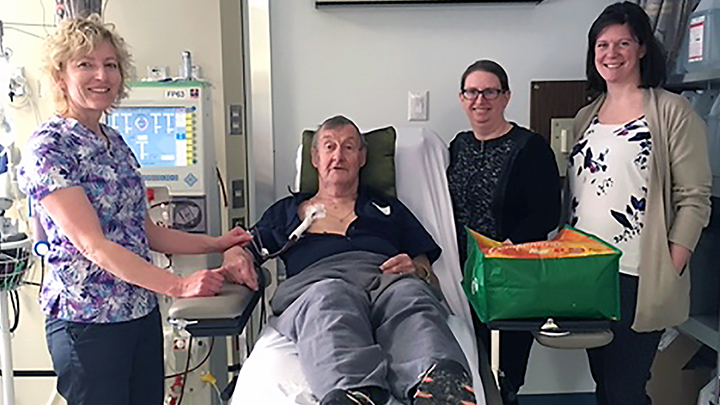
February 27, 2019

Expanded hours at the Drayton Valley dialysis unit means that more local patients like Dennis Bowers, centre, can now access care closer to home. Welcoming him, from left, are Registered Nurse Charlene Buchan, Janice Thompson, interim unit manager, and Sarah Slater, incoming unit manager.
Story by Heather Kipling
DRAYTON VALLEY — Dennis Bowers knows firsthand the convenience of being able to access hemodialysis close to home, as well as the challenges that come with having to travel to receive it.
Since November 2017, the Evansburg resident has been receiving dialysis three times a week at the Drayton Valley Hospital and Care Centre’s hemodialysis unit. It’s about a 30-minute drive, which is a far cry from the 90 minutes – or more – that Bowers and his wife would spend on the road to Edmonton where he previously received dialysis.
“Not having to travel that far is wonderful,” says Bowers. “It was very stressful having to travel, to worry about construction, the weather, the cost of it all. I’m so thankful that I only have to drive for a few minutes now.”
Like Bowers, more patients from the Drayton Valley area with chronic kidney disease will be able to access dialysis at the Drayton Valley Hospital and Care Centre, as the dialysis unit expands its hours to offer additional appointment times.
Dialysis is now being offered six days a week, up from three days a week, since Feb. 18.
The unit will continue to operate 6 a.m. to 6:15 p.m. on Mondays, Wednesdays and Fridays, with additional appointment times available from 6 a.m. to 12:15 p.m. Tuesdays, Thursdays and Saturdays. The extra service hours will provide space for four additional patients from the Drayton Valley area to receive the care they need, closer to home.
The unit currently provides treatment for eight patients.
“I’m so pleased we are increasing dialysis in Drayton Valley and helping more people receive this life-saving treatment closer to home,” says Minister of Health Sarah Hoffman. “This expansion is an example of our government’s work to strengthen public healthcare and to fight for the needs of patients and families in rural and northern communities.”
Hemodialysis is the process of cleansing the blood of toxins and excess fluid when normal kidney function is reduced. A patient’s blood is filtered through a dialyzer and returned to the body. Treatment, which can take four hours, is often required three times a week.
An aging population, rising diabetes rates leading to renal failure, and patients living longer on dialysis due to medical advancements are all factors contributing to increased demand for dialysis across the province.
“Creating additional capacity requires collaboration by multiple stakeholders – whom we would like to thank – so that we’re able to accommodate our local patients,” says Janice Thompson, manager of the dialysis unit in Drayton Valley. “Receiving treatment close to home helps decrease the burden of travel and improves quality of life for our patients.”
The dialysis unit at the Drayton Valley Hospital and Care Centre operates within AHS’ Alberta Kidney Care – North, formerly the Northern Alberta Renal Program. Alberta Kidney Care – North provides assessment, treatment and follow-up for people with kidney problems in a geographical area that includes central and northern Alberta, where more than 142,000 facility-based hemodialysis treatments were delivered last year.
The program also provides other treatments for chronic kidney disease, including peritoneal dialysis, home hemodialysis and conservative care, which enables patients to enjoy the best quality of life possible without hemodialysis.
For Bowers, knowing other patients like him will be able to experience the benefits of less travel is welcome news. And he has no doubt new patients will be made to feel right at home.
“The staff here are beautiful people, every one of them. They get to know you and your family, and they care about you,” he says. “They make you feel like you’re at home when you’re here. It’s a wonderful place to be cared for.”